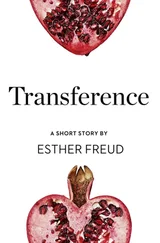Peter Orner - Esther Stories
Здесь есть возможность читать онлайн «Peter Orner - Esther Stories» весь текст электронной книги совершенно бесплатно (целиком полную версию без сокращений). В некоторых случаях можно слушать аудио, скачать через торрент в формате fb2 и присутствует краткое содержание. Год выпуска: 2013, Издательство: Back Bay Books, Жанр: Современная проза, на английском языке. Описание произведения, (предисловие) а так же отзывы посетителей доступны на портале библиотеки ЛибКат.
- Название:Esther Stories
- Автор:
- Издательство:Back Bay Books
- Жанр:
- Год:2013
- ISBN:нет данных
- Рейтинг книги:4 / 5. Голосов: 1
-
Избранное:Добавить в избранное
- Отзывы:
-
Ваша оценка:
- 80
- 1
- 2
- 3
- 4
- 5
Esther Stories: краткое содержание, описание и аннотация
Предлагаем к чтению аннотацию, описание, краткое содержание или предисловие (зависит от того, что написал сам автор книги «Esther Stories»). Если вы не нашли необходимую информацию о книге — напишите в комментариях, мы постараемся отыскать её.
The discovery of a murdered man in a bathrobe by the side of a road, the destruction of a town's historic City Hall building, and the recollection of a cruel wartime decision are equally affecting in Orner's vivid and intimate gaze. The first half of the book concerns the lives of unrelated strangers across the American landscape, and the second introduces two very different Jewish families, one on the East Coast, the other in the Midwest. Yet Orner's real territory is memory, and this book of wide-ranging and innovative stories remains an important and unique contribution to the art of the American short story.
Esther Stories — читать онлайн бесплатно полную книгу (весь текст) целиком
Ниже представлен текст книги, разбитый по страницам. Система сохранения места последней прочитанной страницы, позволяет с удобством читать онлайн бесплатно книгу «Esther Stories», без необходимости каждый раз заново искать на чём Вы остановились. Поставьте закладку, и сможете в любой момент перейти на страницу, на которой закончили чтение.
Интервал:
Закладка:
The ball strikes, and the twin sets of pillars that lorded the front door crack and topple.
Of course he’s not the only sap who knows that nothing they do is going to reopen a single mill. That a highway’s so people can drive through Fall River, not to it. He doesn’t corner the market on detecting bull when it froths out politicians’ mouths. But others who know the truth, his brother, Leon, for example, gave it up. Leon, who is where right now? On a beach? The government’s going to build what the government wants to build. You forgotten the pharaohs? May as well dig up F.D.R. and blame him. May as well go fishing in the Taunton with your pinkie.
But today, if nothing else, Walt insists on being up close to the destruction. This wafting of a hundred-some-odd years of undisturbed dust. He breathes it in, almost enjoying it, like sniffing the sweet rot at the back of Sarah’s refrigerator.
And it goes far beyond the killing of his livelihood. That the route the DPW and the city council finally agreed upon went smack through Kaplan’s, but somehow, like some miracle of Jesus, avoided Nate Lyons’s Furniture Warehouse not a quarter mile away on Granite Block. Not to mention all the banks in town, and Sharder and Nolte’s, Small Brothers, L. D. Wilbur’s, Boyko Typewriters and Adding Machines… Mr. Kaplan, be reasonable. All citizens, at one time or another, must make sacrifices for the sake of the common achievement …That they forced him, a self-employed man, to go to work for Sarah’s fascist cousin Morris, the broker. Broker of what? Anything you can stick a price on, honey. That they turned him into a lackey with hardly an office, a peephole with a desk crammed in — with that little Führer speeching at him all day about how he’s never met less of a striver than Walt Kaplan. (“That’s how you lost the branches, kiddo. You’re slow on your feet. Don’t forget the highway didn’t take away your daddy’s branches. You lost them long before.”)
The ball smashes the clock below the dome, the clock that was always slow. Everybody in town adjusted their watches to it, and Fall River was known as the town that was seven minutes off. How fast it takes to kill. There’s an explosion followed by a loud sucking noise as the dome, screeching glass and grinding, caves in.
The joke is that nobody loves this city more. When he was a kid they’d say their pledge of allegiance, and then Mrs. Gerstadt would ask in singsong, Now, children, what makes our city so wondrous special? He can still chant the chant: Awnings, bedspreads, combed yarns, curtains, knitwear, shirts, sweaters, bathrobes, handbags, corsets, drapes, mattresses, braids, roll covers, sport clothes, thread, raincoats, plastics, furniture, luggage, underwear, industrial textiles!
Nearly blinded by the dust, sneezing, he finally turns away, and the clack of his shoes is empty defiance. But he’ll take it. He laughs, and it scalds his throat. A funeral now, and I’m a mourner. Our fair City Hall. Born in 1845. The mother, a Flemish architect. Mrs. Gerstadt’s toothless grinning: Not from Flemland, but from where? Children? Where does a Flemish person call home?
And didn’t his father walk him through the long corridors, fingering portraits of dead old turkey-throated mayors as though the Buffingtons and Fozzards were Washingtons and Jeffersons? The echo beneath the dome. The way a whisper became a murmur became a shout.
He’s due at work, but after what he’s seen? Over the phone yesterday Leon said, “Why torture yourself? Get out of town for the day. Take Sarah to Boston. Buy her a steak at Jimmy’s. Enjoy yourself half a day in your life. It’s over, over.”
Before his brother left, as the two of them were clearing out the last of the inventory and adjusting the books, Walt had snarled, “What kind of person moves to Florida to live?”
“Is that a question?”
“Enlighten me, grace me.”
And Leon had sat in their father’s ancient swivel chair and raised his legs and whirled the way they used to when they were stock boys. Cause it’s warm. Cause Bets loves it there. Cause her sisters live there, even though she hates them. Cause we’ve got the apartment in Fort Myers paid for. Cause they’re driving the goddamned autobahn through our store. Because this town’s not through dying. Cause I put a little money away. Unlike you. Cause it’s warm.
Not going back to the peephole today, because having to listen to that Morris would only drive the stake deeper. Cousin Morris, so kind to give you a job, Sarah says. You know he can’t afford to go around giving handouts. How can you complain when it’s honest work? And Walt saying, You don’t understand, it’s just talking. Moving money around. Not the kind of work I’m used to. Honest work, she says, as if his thirty-seven years of selling furniture was stealing from people.
Still listening to the crushing, preposterous warlike barrage, he walks down Third Avenue (avoiding South Main, where there’s a hole where his store used to be) and across Rock Street. Then up Union Avenue. Halfway up the hill, the clamor becomes mercifully more faint, as though the tired clapboards are soaking up the sound. Christ Almighty, I’ll stomp to Kansas City. Pains everywhere, but legs like tree stumps. He leans into the hill and marches. He salutes an old salty out on her porch, and she fumbles with her glasses and smiles. The decrepits always went for him. He could sell a newfangled recliner with all the bells and whistles to a crocker on her last legs. Die with your feet up, my royal lady, and don’t forget we now also carry Congoleum Rugs and Gruno Refrigerators. He marches on. Prices so low, your conscience will bother you. He knows every tree stump, every graffitied initial. Knows who laid the cement for the sidewalk without looking down and reading the patinaed bronze plaque: O’CONNOR AND ANGELL, CONTRACTORS, FALL RIVER, 1893.
And he reaches 100 Delcar, and he’s home but not home. Sarah can’t see him, or there’d be all kinds of shrieking. What kind of man’s not at work at 2:30 in the afternoon on a Monday? He creeps around back and hides behind the boulder. Collapses faceup on the grass. He can hardly keep up with his own breathing as the damp seeps through his pants. The kitchen window’s open. The pooh-bah’s on the telephone. He feels the rock against his head. He sees the ball’s slow hover and Sarah’s plump fingers twisting the phone cord. Sees his brother spinning around in a chair in a room that no longer exists — and still Sarah talks. Our whole caboodle’s getting bashed to hell, and it’s caving, yes caving. But my scrumptious porkette’s big mouth’s keeping talking. “I didn’t tell her casserole was a bad idea, only that it might be wrong for the occasion, and Lorraine says why am I meddling in the food, and I said I’m overall chairman, and she says then why don’t you worry about being chairman, and I said that’s what I’m doing, worrying, and she says well, don’t worry, and I said well, which is it, worry or don’t worry?” He sinks further into the wet ground, loving her. He wants to climb in through the window and prance her around the kitchen bellowing like a lunatic, drag her upstairs, pull the shades, bite off her buttons, let the phone ring till it kills itself. And laugh, laugh. But he’s a stowaway in his own yard, and also, much as he tries, much as he needs the rescue of it, he can’t turn his quickened breathing into anything other than an old man’s gasps.
High Priest at the Gates
WALT USED TO STAND outside the cemetery gates and smoke, because under some ancient law from the Talmud that he happily took advantage of, but never fully understood, he wasn’t permitted to enter cemeteries, because he, Walt Kaplan, was a Kohen, a genuine descendant of high Hebrew priests. Of course he got a bang out of being royalty. He used to go around sometimes licking his finger and anointing people duke of this, duchy of that, even called Alf Dolinsky “my liege.” When Dolinsky said that’s not Hebrew, Walt said even the pope doesn’t preach to his flock in Latin anymore. “Benevolent eminences like myself have to change with the times.” Once, during Sarah’s Aunt Ida’s graveside service — Ida was so old for so long that most people forgot she hadn’t died yet and were genuinely shocked when it happened — Walt put on one of those Burger King crowns and greeted people after the service with a gloved hand and a blessing, till Sarah whispered that if he didn’t take that thing off in two seconds she’d rip his head off. But it was also out there with his pack of Kools, in front of the gates, across the street from the gas station, that Walt would ruminate on all the time he was going to have to spend inside the gates, among those graves, inside a cheap casket from Gould’s. His status as a member of the Kohanim applied only to his living flesh; dead he was the same gone schlump as everybody else. And even on the day Ida was disappearing into that irregularly mowed grass forever (he could hear Rabbi Gruber intone his stock line: “We shall always remember the cheerful countenance of the deceased”), he couldn’t help comparing the time we spend there, and working the whole thing out in his head for the nine millionth time and thinking again: Nasty joke. Here’s your body. Now watch it die. Watching the crowd of mourners through the gates and wanting to shout that they all had it backward. Clowns, it’s us, the ones still paying taxes, who need some honoring. It’s the lucky stiffs in the ground — Ab Sisson, Teddy Marcowitz, Pearl Brodsky, Lou Jacobs, Hyman Sobiloff, and now even poor Ida — who should show more respect. They’re the ones who should be huddled and bundled and murmuring and remembering. They’re the ones who should be blowing snot in their hands. All Ida and the rest of the sleepers deserve is a handshake goodbye, maybe a peck on the cheek farewell, because for them it’s a simple matter of going away, of leaving, of forgetting keys, wallet, driver’s license, cash — an easy vamoose. You want sorrow? Out here! He wants to roar it at the backs of the mourners. Turn around! Out here beyond the gates, suckers! Turn around!
Читать дальшеИнтервал:
Закладка:
Похожие книги на «Esther Stories»
Представляем Вашему вниманию похожие книги на «Esther Stories» списком для выбора. Мы отобрали схожую по названию и смыслу литературу в надежде предоставить читателям больше вариантов отыскать новые, интересные, ещё непрочитанные произведения.
Обсуждение, отзывы о книге «Esther Stories» и просто собственные мнения читателей. Оставьте ваши комментарии, напишите, что Вы думаете о произведении, его смысле или главных героях. Укажите что конкретно понравилось, а что нет, и почему Вы так считаете.












